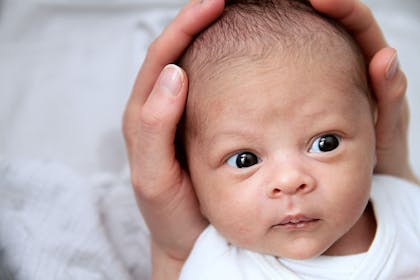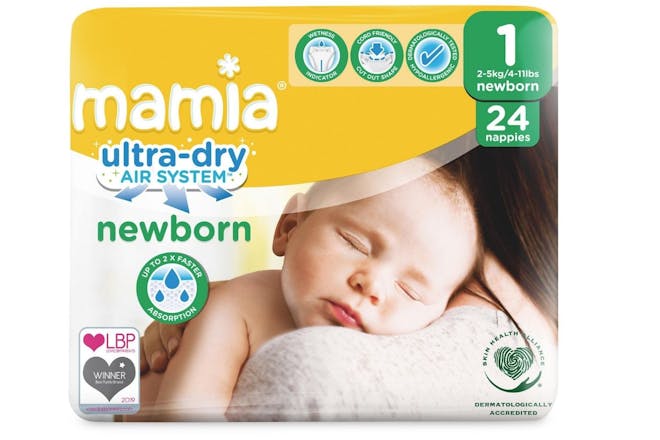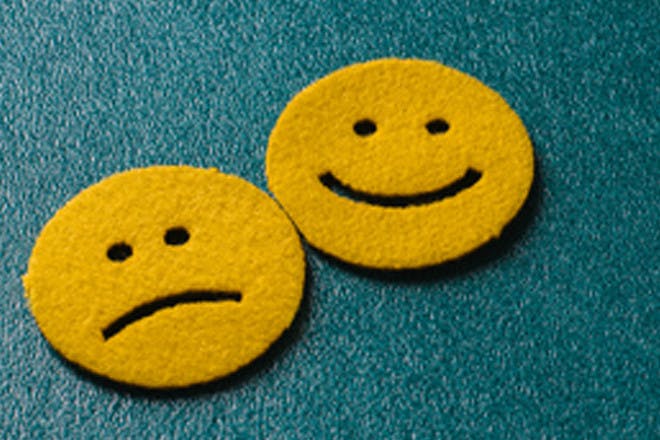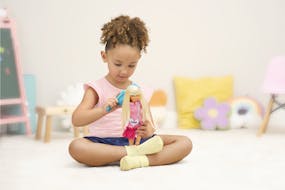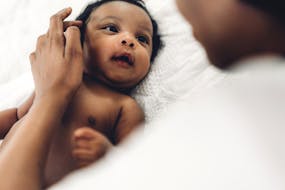Your newborn baby: what to expect
Advertisement Promotion
You've just met your newborn baby! It's an exciting new world and you'll be learning more about your baby every day. Find out what to expect in your baby's first week...
Once you welcome your new baby into the world it will feel like there's so much to learn! You might find it easier to take things one week at a time, so here's everything you need to know about your baby's first week of life. Plus, information on how you might be feeling as a new mum.
Your newborn baby: development
Your baby is born with a number of natural reflexes, plus all of their senses. These include:
- Eyesight: Your baby's eyes will be checked shortly after birth as part of their newborn physical examination. Newborn babies can see, but their vision isn't very focused, and their eyesight will develop gradually over the first few months. However, they can still look at people, particularly faces, and objects that are within about 20-30cm of their face – and they might even mimic facial expressions.
- Hearing: Newborn babies can hear and will enjoy the sound of a soothing voice – and they might also recognise your voice soon after birth, as they'll have got used to it in the womb. However, they might be startled by loud noises.
- Touch and smell: Newborn babies will enjoy gentle touch and might also start to recognise your unique smell soon after birth. Some experts recommend using fragrance-free cosmetics in these early days, so your baby can be comforted by your natural smell.
- Sucking: Babies are born knowing how to suck, and during their first few days they will learn how to coordinate sucking and breathing while they drink milk. They'll also automatically turn towards a nipple or teat if it's brushed against their cheek, and they'll open their mouths if their upper lip is stroked.
- Grabbing: Your newborn baby will be able to grasp your finger with their hand or toes.
- Stepping: Your baby will make stepping movements if they are held upright on a flat surface – it'll be a long time before they can support themselves, though!
Medical checks for your newborn baby
Your baby will have various medical checks in their first week of life to make sure they're healthy.
FREE NEWBORN NAPPIES
Within the first 24 hours , a health professional will offer to give your baby a vitamin K injection . This is to prevent a rare but serious blood disorder called VKDB (vitamin K deficiency bleeding), which causes bleeding in babies.
Within the first 72 hours , your baby will also have a thorough newborn physical examination . This will involve checking their eyes, heart, hips and testicles (in boys) for possible problems.
When they are around five days old , your baby will also have a newborn blood spot screening (also known as the heel prick test) . A health professional will take a small blood sample to find out if your baby has one of nine rare but serious health conditions.
Within the first few weeks, your baby will have the newborn hearing screening test . This is to help identify permanent hearing loss as early as possible. If you give birth in hospital, you might be offered a newborn hearing test for your baby before you're discharged. Otherwise, it'll be done by a health professional within the first few weeks.
Other things to be aware of include:
- Their umbilical cord: The part of the cord still attached to your baby will take around a week to dry out and drop off. Make sure to keep it clean and dry until then, and tell a health professional if there is any bleeding or discharge. Learn more about umbilical cord care.
- Jaundice: At around three days old, some babies develop mild jaundice . This will make their skin and the whites of their eyes look a bit yellow. Mild jaundice is caused by pigments released during the breakdown of old red blood cells and is more common in babies delivered by forceps or ventouse. It will usually fade on its own within about 10 days, but more severe jaundice might need treatment. It's always best to give your GP or midwife a call to mention it, just to be on the safe side.
- Newborn spots: Spots (baby acne) are very common in newborns and they might appear and disappear. However, if you notice a change in your baby's behaviour, like if they aren't feeding well, are very sleepy or very irritable, you should tell a midwife or GP immediately. Check out our gallery of baby rashes to see what different types of spots can mean.
- Bruises: It's common for newborn babies to have some bruises and swelling on their head, and sometimes bloodshot eyes. This is caused during birth, and is particularly common in babies who have been delivered by forceps or ventouse. They should disappear soon after birth but ask your midwife if you're worried.
- Fontanelles: These are the soft spots on your baby's head where the skull bones haven't fused together yet. The bones will take around a year or more to fully close over. But it's fine to gently touch and wash the fontanelles, as they are covered by a protective membrane.
- Genitals and breasts: It's common for newborn babies' breasts to be slightly swollen and to ooze some milk, whether they are a boy or a girl. Their genitals might also appear swollen, but should appear normal within a few weeks. Baby girls can also have some vaginal bleeding or some white, cloudy discharge; this is caused by the hormones passed from you to your baby before birth and there's no need to be worried.
What do you need to buy for a newborn baby?
While you'll probably have extensively prepared in advance for the arrival of your newborn baby, it's easy to forget things and to get lost in everything new that's happening.
Aldi Mamia has a huge range of newborn products , with everything you need to stylishly kit out baby's nursery, through to super soft and cosy sleepsuits, and must-haves such as bottles and sterilisers, plus all the bits and bobs for your hospital bag, too, all at affordable prices.
Look out for the regular Baby & Toddler sales for even more baby bargains.
Here are some of the baby essentials to bring to the hospital and to have ready at home to welcome your newborn baby:
- Newborn nappies
- A baby blanket
- A rear-facing car seat
- Baby clothes
- Baby hats, gloves and socks
- A breast pump
- Baby wipes and rash cream
- A cot or crib for your baby to sleep in
- A changing mat
- A baby bath or bowl
- Soft towels
- Baby nail clippers
- A baby comb
- A baby thermometer
How to choose nappies for your newborn baby
Nappies can be something of a minefield with a newborn, and it can be trial and error to find the brand, size, and type that works best for you and baby, and of course, your budget.
Some parents will choose to use reusable, or cloth nappies, for their little ones, and there are some brilliant initiatives from local councils around the country to encourage cloth use, from vouchers to cash back offers.
If you are choosing to use disposable nappies, you may well feel a little overwhelmed looking at the vast displays on the supermarket or chemists shelves. Where to begin! Your newborn baby will need changing around 10 to 12 times a day, so you'll be getting through a lot of nappies those first few months! And knowing you have a brand you can rely on not to leak, that fit well under your little one's sleepsuits or outfits, and which are soft and gentle on their skin, will make changing time much less of a chore – not to mention less of the risk of a poonami or soaked through clothes!
Nappies are sized by babies' weight, and are generally labeled from 1 to 7 - with 1 for newborns, through to size 7 for older babies and toddlers.
Aldi Mamia Ultra Dry Air System™ nappies in size 1 are designed specifically for newborns, and are perfectly sized for babies who weigh between 2-5 kg / 4-11 lbs. They have overlapping fasteners to ensure a snug, secure fit, and the nappies are super soft and hypoallergenic - dermatologically accredited in fact - so ideal for delicate skin.
If you're buying nappies before your baby is born, when you won't be entirely sure what they'll weigh, size 1 is the perfect choice. It's a good idea though not to buy huge amounts in just one size until your baby is here and you know exactly what you (they!) will need.
You can even get a FREE full-size pack of Aldi Mamia newborn nappies here , to help you make savings.
Feeding your newborn baby
Breastfeeding
If you're breastfeeding your baby, it will take some time to get used to in the first few days or weeks of feeding. Your midwife or health visitor will be able to help you with the correct positioning and attachment for your baby.
Don't be disheartened if it takes you and your baby a little while to get the hang of it. Breastfeeding is one of the best things you can do to give your baby a healthy start in life, and it gets much easier after the first few weeks.
In the first few days after birth, your breasts will produce a thick, golden yellow fluid called colostrum . This is a very concentrated type of milk, so your baby will only need a small amount, about a teaspoonful, each time they feed.
During the first few days, your baby might want to feed regularly, as often as every hour. After a few days, your breasts will start to produce more 'mature' milk, and your baby will start having fewer but longer feeds.
Plus, the more that you breastfeed, your baby's sucking will stimulate more milk production.
As a rough guide, your baby should feed at least eight to 12 times, or more, every 24 hours during the first few weeks, according to the NHS . But don't worry if your baby is feeding more often than this; it's not possible to overfeed a breastfed baby, and it's fine to feed them whenever they are hungry or when your breasts feel full.
Check out our top breastfeeding tips, and if you're struggling with breastfeeding, visit our breastfeeding drop-in clinic , where trained Parent Supporters are waiting to answer your questions.
Feeding your baby formula milk
If you choose to bottle-feed your baby, you should also feed them whenever they show signs that they're hungry; but don't force them to finish a feed if they have had enough. Follow their lead!
Make sure to use the amount of formula powder recommended on the packaging and avoid adding extra. Don't add extra water in hot weather, either, as your baby may miss out on key nutrients.
Read more about bottle-feeding your baby , or get tips on how to find the right formula for your little one.
Signs that your baby is hungry
Some of the signs that your baby is hungry include:
- getting restless
- sucking their fist or fingers
- making murmuring sounds
- turning their head and opening their mouth (also known as rooting)
It's best to try and feed your baby when they show these early signs of being hungry, rather than doing so once they start crying, as crying will make it more difficult to feed them.
How to wind a newborn baby
You can burp your baby during or after their feed; whenever it seems like they need it! If your baby seems uncomfortable while feeding, have a break to burp them. If they seem fine while feeding, wait until they've finished.
There are different positions you can try. You can hold them upright over your shoulder or sitting on your lap, or lie them across your lap, then gently rub or pat their back to bring up any wind.
How much sleep does a newborn baby need?
Newborn babies will sleep on and off throughout the day and night. In fact, most newborn babies will be asleep more than they are awake!
The amount of sleep a newborn needs will vary from baby to baby, but it can range from eight hours up to 16 or 18 hours daily, according to the NHS , and your baby will wake during the night to be fed.
Where should your newborn baby sleep?
For the first six months your baby should be in the same room as you when they're asleep, during both the day and night.
During the first few months, they should sleep in a crib, carrycot or Moses basket . If you're buying a new cot, check that it meets safety standards by looking for the British Standard mark BS EN 716-1, which is recommended by the NHS .
How to cover a newborn baby at night
You shouldn't use pillows and duvets for babies less than a year old, as there is risk of suffocation. Plus, duvets can make your baby too hot.
Instead, use a light blanket tucked in firmly below your baby's shoulder level, or a baby sleeping bag.
Don't use cot bumpers, and don't let your newborn sleep with a cuddly toy (or anything else) in their cot. These can both be suffocation hazards.
Learn more about safe sleeping for babies , including how to reduce the risk of sudden infant death syndrome (SIDS).
How to bathe a newborn baby
There's no need to bathe your baby in the first few days after the birth. Vernix – the white, greasy substance that was probably on your baby's skin after the birth – is a natural moisturiser that can also help to protect your baby from infection.
Instead, you could try 'topping and tailing' your baby in the first few days (and later, on days when you don't want to give your baby a full bath). This is when you use cotton wool and water to clean their face, neck, hands and bottom. Just make sure to use a different piece of cotton wool for each part of the body, and for each individual eye.
After the first few days, you don't need to give your baby a bath everyday, but there's no reason why you shouldn't if they really enjoy it!
It's best to wash your baby just with plain water for at least the first month. You could use some mild, non-perfumed soap if you want to, but avoid skin lotions, medicated wipes or adding cleansers to your baby's bath water.
You can bathe them in a baby bath or clean washing-up bowl and use warm, not hot, water. Gently lower them into the bath, keeping their head above the water, and swish water over them.
Get more tips on bathing your baby.
How to care for your baby's skin
When babies are first born, their skin tends to be very thin and easily damaged, but will develop its own natural protective barrier over the first month. Babies are also born covered in vernix , the white sticky substance that covers their skin in the womb. This should be left to absorb naturally.
If your newborn baby is premature, their skin will be even more delicate, so the staff at their birth will be able to advise you on skincare.
If your baby was overdue, their skin might be dry and cracked because the vernix has already been absorbed. There's no need to use creams or lotions, and the top layer of their skin will peel off over the first few days anyway.
How to dress a newborn baby
Your baby will grow very quickly, so it's best not to buy too many newborn outfits as they will only grow out of them!
As a general guide, they'll need around six stretch suits for night and day, plus some vests, cardigans, hats, mittens and socks to keep them warm.
Vertbaudet has a great range of baby clothes that are cute, but won't break the bank. See more details here.
Your body after birth
As well as focusing on your newborn baby, this is also a time to focus on you, as your body will be going through a lot of changes, too. Some things to be aware of include...
- Stitches: If you've had stitches, make sure to bathe them every day with plain warm water and pat dry. If they become sore or uncomfortable, tell your midwife, and check with them before taking any painkillers.
- Going to the toilet: It might sting or feel sore to wee. Drinking lots of water will help to dilute your wee, but tell your midwife if you're finding it very difficult or feel very sore. Pelvic floor exercises can help with a leaky bladder. You also probably won't poo for the first few days after birth, but make sure to eat enough fibre-filled foods to stop yourself becoming constipated. Speak to your midwife or GP if you have constipation that won't go away, or you leak any poo when you don't mean to. Pro tip: keep a squeezy bottle of water next to the loo, and pour it over your vulva as you pee; this will dilute the pee and stop it from stinging any cuts or stitches.
- Piles: Piles (haemorrhoids) are common after birth but usually disappear within a few days. Eat plenty of fibre-filled foods and drink lots of water to make pooing easier, and try not to strain. Creams can also help.
- Bleeding after birth (lochia): You'll have some vaginal bleeding for the first few weeks after birth, even if you've had a C-section. Use maternity pads or super-absorbent sanitary towels, and avoid using tampons until after your six-week postnatal check. You might also feel cramps similar to period pains. The blood should turn brown and decrease until it stops after a few weeks, but tell your midwife if you're losing blood in large clots.
- Your breasts: Around two to four days after birth you might notice that your breasts become fuller, which is what people often call your milk "coming in". You might also find that breastmilk leaks from your nipples. You can wear breast pads to stop your clothes becoming wet, or you can always express some milk or feed your baby if they haven't been fed recently.
- Your tummy: Your tummy will probably still be quite a bit bigger than it was before pregnancy straight after you've given birth – but this is normal and down to the fact that your muscles have stretched, so it's nothing to worry about! If you've had a C-section, you'll need to take extra care with your scar while it heals, and avoid carrying heavy weights.
Read up on the postnatal symptoms you should never ignore , and learn more about your body after the birth , including C-section recovery.
Your feelings as a new mum
You're bound to feel all kinds of new emotions as a new parent, so it's important to pay attention to how you're feeling.
The 'baby blues'
In the first week after birth, it's common for new mothers to get what's often called the 'baby blues'. This means you might experience low mood and might feel mildly depressed after having your baby. It's thought to be down to the sudden hormonal and chemical changes taking place in your body after giving birth.
'Baby blues' symptoms can include:
- feeling emotional and bursting into tears for no apparent reason
- feeling irritable or touchy
- low mood
- anxiety and restlessness
All of these symptoms are normal and will usually only last for a few days. In the meantime, check out these ways to beat the new-mum blues .
Postnatal depression
While feeling the 'baby blues' is normal, it's important to distinguish between this and postnatal depression.
Postnatal depression usually occurs between two and eight weeks after giving birth , but it can sometimes happen up to a year later. Postnatal depression is thought to affect at least one in ten women, and it's important not to suffer in silence.
According to the NHS, emotional signs of postnatal depression include:
- loss of interest in your baby
- feelings of hopelessness
- not being able to stop crying
- feelings of not being able to cope
- not being able to enjoy anything
- memory loss or being unable to concentrate
- excessive anxiety about your baby
Meanwhile, some more physical signs include:
- panic attacks
- sleeplessness
- extreme tiredness
- aches and pains
- feeling generally unwell
- anxiety
- loss of appetite
Of course, it's likely that most new mums will feel some of the above symptoms at one point or another. However, if you feel that your mood is low and you're experiencing the above symptoms for more than a fortnight, you might be suffering from some degree of PND .
It's important not to suffer in silence, and postnatal depression is an illness just like any other. You can seek help from a health professional, visit your GP, and you can also get support and advice from other mums in the same situation on our PND support forum .
Looking for more information on your newborn baby and what to expect as a new mum? Check out our other articles below or chat to parents in the forum.
Related stories
8 things that can affect your newborn baby
